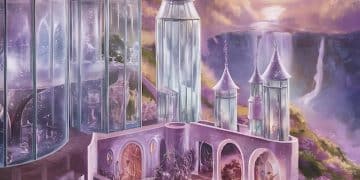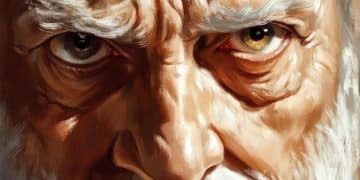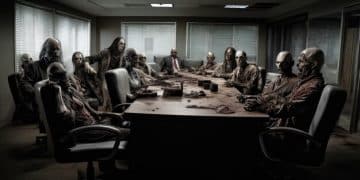The Politics of Magic: Mages, Kingdoms, and the Eternal Fire
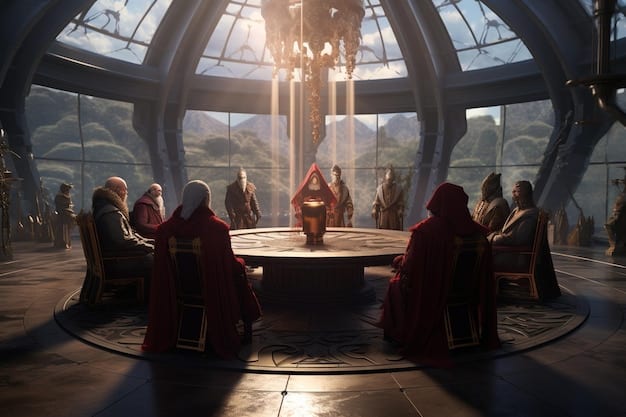
The Politics of Magic in fantasy settings explores the complex relationships between mages, kingdoms, and religious institutions like the Church of the Eternal Fire, highlighting power struggles, social hierarchies, and the ethical dilemmas that arise from the control and use of magical abilities.
Delve into the intricate web of the politics of magic, where mages, kingdoms, and the zealous Church of the Eternal Fire vie for power, influence, and control, shaping the destiny of entire worlds.
The Delicate Balance of Power
Magic, in many fantasy narratives, is not just a force of nature; it’s a commodity, a weapon, and a symbol of power. The control and distribution of magic often dictates the political landscape, creating a delicate balance between mages, who wield this power, and the kingdoms that seek to control it.
Kingdoms often view mages with a mixture of fear and reverence. Their abilities can be invaluable assets, capable of bolstering defenses, enhancing agriculture, and even swaying the tide of war. However, the unchecked potential of mages also poses a threat to the established order, leading kingdoms to implement various measures of control, such as mage guilds, royal academies, or outright subjugation.
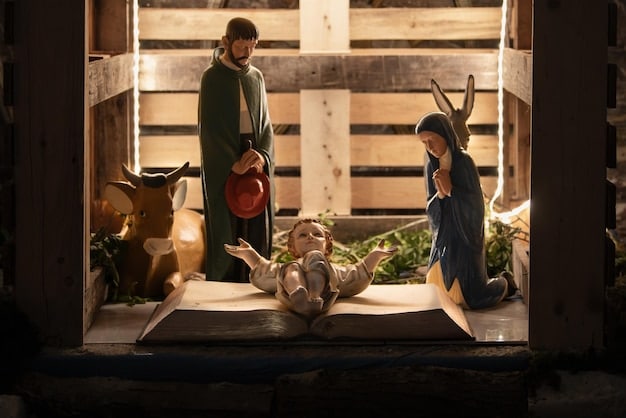
Mage Guilds and Royal Academies
Mage guilds and royal academies serve as institutions where mages are trained, regulated, and often bound to the service of the kingdom. These institutions provide a structured environment for the development of magical abilities while also ensuring that mages adhere to certain rules and loyalties.
However, these institutions can also become centers of political intrigue, as different factions within the kingdom vie for control over the training and deployment of mages. The curriculum, the selection process, and the overall direction of these institutions can be heavily influenced by political agendas.
- Curriculum and Control: The subjects taught and the methods of training can be manipulated to serve specific political goals, ensuring that mages develop the skills and ideologies desired by the ruling powers.
- Selection Process: The criteria for admission can be biased to favor certain social classes or political affiliations, creating a divide within the mage community and reinforcing existing power structures.
- Internal Factions: Different instructors and students may align themselves with various political factions, leading to internal conflicts and power struggles within the institution.
This delicate balance of power can easily be disrupted, leading to rebellions, civil wars, and the rise of powerful mage-kings who challenge the authority of traditional monarchs. The presence of magic introduces a volatile element into the political equation, making alliances fragile and betrayals commonplace.
The Church of the Eternal Fire: A Divine Counterbalance
In many fantasy worlds, religious institutions like the Church of the Eternal Fire serve as a counterbalance to the power of magic. They often view magic with suspicion, considering it an unnatural force that threatens the divine order. This suspicion can lead to outright persecution of mages, creating a climate of fear and oppression.
The Church of the Eternal Fire often promotes the idea that magic is inherently corrupting, tempting mages to abuse their power for selfish or evil purposes. They advocate for strict control over magic, often calling for its complete eradication. This stance puts them in direct conflict with both mages and the kingdoms that rely on their abilities.
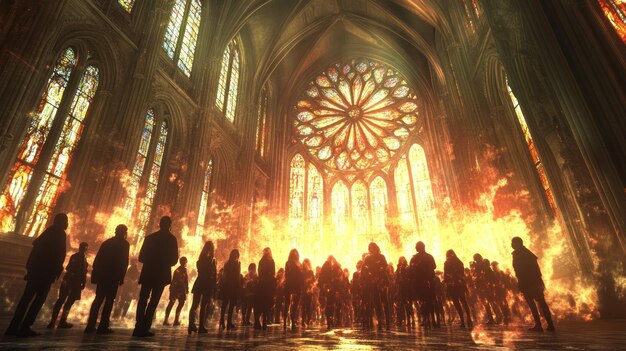
Theological Conflicts and Political Maneuvering
Theological differences often translate into political maneuvering, as the Church of the Eternal Fire seeks to influence the policies of kingdoms and undermine the authority of mages. They may use propaganda, excommunication, or even outright warfare to achieve their goals.
The Church’s influence often extends beyond religious matters, shaping social norms, moral values, and even the legal system. Their condemnation of magic can lead to discrimination against mages, limiting their opportunities and forcing them into hiding. This creates a cycle of resentment and rebellion, further fueling the conflict between mages and the Church.
- Propaganda Campaigns: The Church disseminates messages that demonize magic and portray mages as dangerous and untrustworthy.
- Excommunication and Sanctions: Individuals or kingdoms that support magic may face excommunication or economic sanctions from the Church.
- Religious Wars: In extreme cases, the Church may launch religious wars to eradicate magic and impose its theocratic rule.
The clash between the Church and mages often reflects deeper societal anxieties about power, knowledge, and the nature of good and evil. The debate over magic becomes a battleground for competing ideologies, shaping the social and political landscape of the world.
Ethical Dilemmas and Moral Gray Areas
The presence of magic also raises a host of ethical dilemmas and moral gray areas. Mages often face difficult choices about how to use their abilities, whether to serve their own interests or the greater good, and whether to obey the laws of the kingdom or follow their own conscience.
The temptation to use magic for personal gain can be overwhelming, especially in a world where power and influence are often determined by magical abilities. Mages may be tempted to manipulate others, amass wealth, or even seek immortality, blurring the lines between right and wrong.
The Responsibility of Power
The immense power wielded by mages also carries a heavy burden of responsibility. Their actions can have far-reaching consequences, affecting the lives of countless individuals and shaping the course of history. Mages must grapple with the ethical implications of their choices, considering the potential impact on society and the delicate balance of power.
The question of whether mages should be held accountable for their actions is a recurring theme in fantasy narratives. Some argue that mages should be subject to the same laws as everyone else, while others believe that their unique abilities warrant special consideration. The debate over mage accountability reflects broader discussions about justice, equality, and the nature of power.
Many fantasy stories explore the idea of forbidden magic, spells or rituals that are deemed too dangerous or unethical to be practiced. The allure of forbidden magic can be strong, tempting mages to cross moral boundaries in pursuit of greater power or knowledge. The consequences of dabbling in forbidden magic can be devastating, unleashing unforeseen horrors and corrupting the mage’s very soul.
The interplay between mages, kingdoms, and the Church of the Eternal Fire creates a complex and dynamic political landscape, filled with intrigue, conflict, and moral ambiguity. The presence of magic challenges traditional power structures, forces individuals to make difficult choices, and raises fundamental questions about the nature of power, responsibility, and the human condition.
Magic as a Tool: Warfare and Espionage
Magic is often weaponized in fantasy settings, becoming a key component of warfare and espionage. Mages can serve as powerful combatants, capable of unleashing devastating spells that can turn the tide of battle. They can also be used for reconnaissance, sabotage, and other clandestine operations.
Kingdoms often employ specialized mage units to bolster their armies, providing them with a distinct advantage over their enemies. These units may be trained in specific types of magic, such as fire magic for offensive attacks or healing magic for support roles. The deployment of mage units can be a decisive factor in determining the outcome of a war.
The Ethics of Magical Warfare
The use of magic in warfare raises a number of ethical questions. Should there be limitations on the types of spells that can be used? Is it acceptable to target civilians with magic? The answers to these questions are often contested, reflecting different moral codes and political agendas.
The potential for magical weapons of mass destruction is a recurring theme in fantasy literature. Powerful spells or artifacts could be used to obliterate entire cities or even continents, raising the stakes of conflict to unprecedented levels. The threat of magical annihilation forces kingdoms to consider the consequences of their actions and to seek ways to prevent the escalation of magical warfare.
- Defensive Magic: Enchanted barriers, wards, and magical defenses are used to protect cities and kingdoms from attack.
- Offensive Magic: Fireballs, lightning bolts, and other destructive spells are used to obliterate enemies.
- Espionage and Infiltration: Illusion magic, mind control, and teleportation are used for spying and sabotage.
Magic can also be used for espionage, providing kingdoms with the means to gather intelligence, infiltrate enemy territory, and manipulate events from afar. Mages can use illusion magic to disguise themselves, mind control to extract information, or teleportation to bypass security measures.
The use of magic in espionage raises similar ethical concerns as its use in warfare. Is it acceptable to use magic to spy on innocent people? Is it justifiable to manipulate or control others for political gain? The answers to these questions depend on the specific context and the values of the individuals or kingdoms involved.
The Social Hierarchy of Magic Users
The ability to wield magic often creates a distinct social hierarchy within fantasy societies. Mages may be revered, feared, or ostracized depending on the prevailing attitudes towards magic and the political climate. Their social status can have a significant impact on their opportunities, their rights, and their overall quality of life.
In some societies, mages are considered to be an elite class, enjoying privileges and status that are unavailable to ordinary citizens. They may serve as advisors to rulers, commanders of armies, or leaders of religious institutions. Their magical abilities make them indispensable to the functioning of society, granting them significant power and influence.
Discrimination and Persecution
However, in other societies, mages are viewed with suspicion and distrust. Their abilities may be seen as unnatural, dangerous, or even demonic. They may face discrimination, persecution, or even outright extermination. Their social status can be precarious, subject to the whims of political leaders and the prejudices of the general population.
The marginalization of mages can lead to the formation of underground communities, where they can practice their magic in secret and protect themselves from persecution. These communities may develop their own unique cultures and social structures, creating a sense of identity and belonging for those who have been rejected by mainstream society.
- Privileged Class: Mages enjoy high social status, wealth, and political influence.
- Ostracized Group: Mages face discrimination, prejudice, and persecution.
- Underground Communities: Mages form secret societies to protect themselves and practice magic in peace.
The relationship between mages and non-mages is often fraught with tension, reflecting deeper societal anxieties about power, difference, and the unknown. The struggle for social acceptance and political equality is a recurring theme in fantasy narratives, highlighting the challenges faced by those who are different and the importance of tolerance and understanding.
The social hierarchy of magic users can also be influenced by factors such as gender, race, and social class. In some societies, women may be excluded from practicing magic, while in others, certain races or social classes may be considered to be naturally more adept at magic. These forms of discrimination can further complicate the political landscape, creating additional layers of conflict and inequality.
The Future of Magic: Evolution and Adaptation
The role of magic in fantasy settings is constantly evolving and adapting to changing social and political conditions. New forms of magic may emerge, old forms may fade away, and the relationship between mages, kingdoms, and religious institutions may undergo significant transformations.
Technological advancements can also have a profound impact on the role of magic. The development of new weapons, modes of transportation, and communication technologies can challenge the dominance of magic, forcing mages to adapt and find new ways to remain relevant. The integration of magic and technology can create new possibilities and new challenges, shaping the future of fantasy societies.
Magic and Technology
The emergence of new threats, such as powerful monsters, invading armies, or existential crises, can also force mages, kingdoms, and religious institutions to cooperate in order to survive. Alliances may be formed, old rivalries may be put aside, and new strategies may be developed to overcome these challenges.
The future of magic is uncertain, but one thing is clear: it will continue to play a vital role in shaping the political, social, and ethical landscape of fantasy worlds. The interplay between mages, kingdoms, and religious institutions will remain a source of conflict, intrigue, and endless possibilities.
- New Forms of Magic: Discoveries or innovations lead to the emergence of new magical disciplines and techniques.
- Integration with Technology: Magic and technology are combined to create new tools, weapons, and conveniences.
- Cooperation and Alliances: Mages, kingdoms, and religious institutions unite against common threats.
Magic remains a dynamic force that shapes the fictional worlds we explore in games and literature, presenting us with endless possibilities for storytelling and world-building. Understanding these dynamic relationships offer a richer and more immersive experience for both creators and audiences.
| Key Concept | Brief Description |
|---|---|
| ⚖️ Power Balance | Delicate equilibrium between mages, kingdoms, and religious factions. |
| 🔥 Eternal Fire | Religious order opposing magic, often seeking its eradication. |
| ⚔️ Warfare Magic | Use of magic in battles and espionage, raising ethical questions. |
| 🧙 Social Status | Varying social positions of mages, from elite to ostracized individuals. |
Frequently Asked Questions
▼
Mages are often feared due to their immense power, which can be difficult to control and may be used for malicious purposes, threatening the established order of kingdoms and societies.
▼
The Church of the Eternal Fire typically acts as an ideological opponent to magic, advocating for its control or eradication, and often engaging in political and religious conflicts.
▼
Kingdoms control magic users through mage guilds, royal academies, and strict regulations to ensure mages’ loyalty and prevent the misuse of their powers within the realm.
▼
Ethical dilemmas include questions about using magic on civilians, the types of spells allowed, and the potential use of magic as a weapon of mass destruction, influencing moral considerations in conflicts.
▼
Advancements in technology may challenge the dominance of magic, prompting magic users to adapt and integrate it with technology, creating new possibilities and complex societal shifts.
Conclusion
The politics of magic presents a rich tapestry of power dynamics, ethical considerations, and social structures within fantasy worlds. By examining the tensions between mages, kingdoms, and institutions like the Church of the Eternal Fire, we gain a deeper appreciation for the complex narratives that shape these fictional societies.


